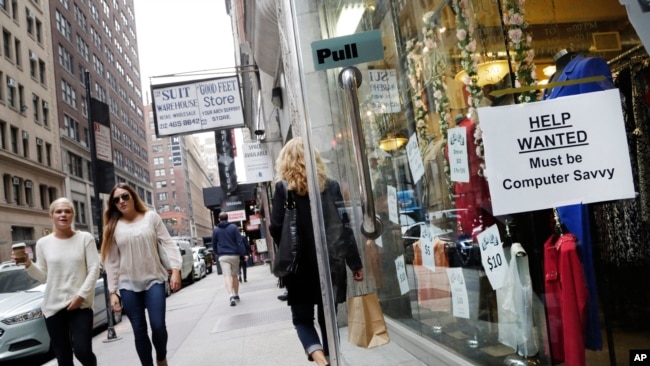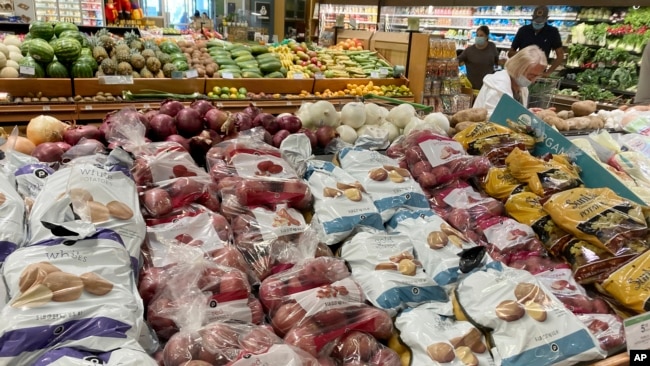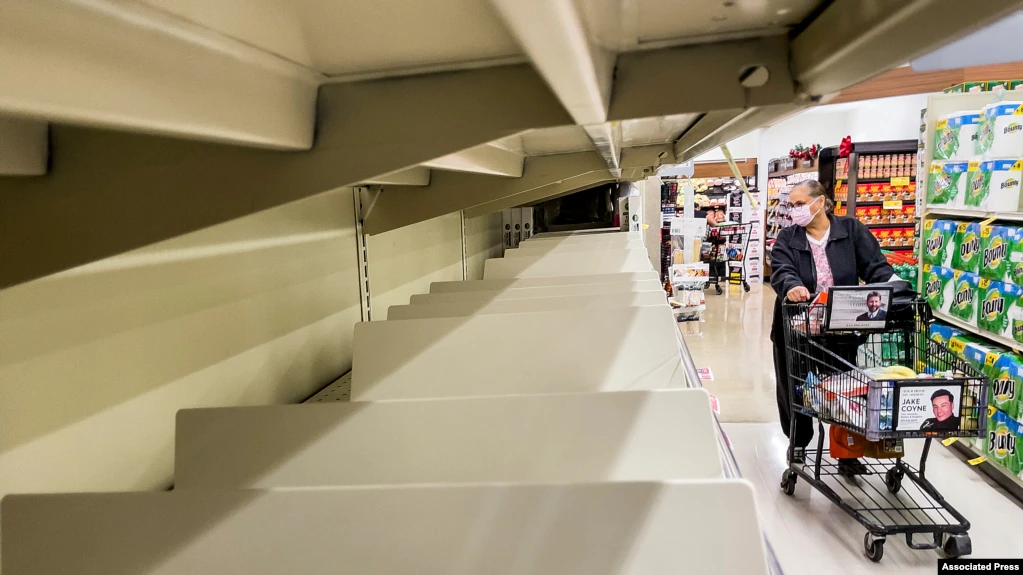NEW ORLEANS — Tawanda Carter is a school librarian in New Orleans, Louisiana. She said preparing for the holidays has presented a unique set of challenges this year, a sentiment shared by millions of Americans.
“Food prices are higher, and a lot of items aren’t even in stock,” she said, as she gets ready to celebrate Thanksgiving with her family in Atlanta, Georgia. “We’ve been keeping an eye out for sales and also thinking about new dishes to make up for the traditional ones we might not be able to eat this year.”
Across the United States, prices on essentials such as groceries and gas are rising at a pace unseen in a generation. Experts say the cause is a mix of worker shortages, supply chain issues and stimulative economic policies enacted to support families and financial markets during the global pandemic. For many, however, the timing of the price increases couldn’t be worse as families prepare for their first holiday gatherings since the rollout of the coronavirus vaccine.
“The price of fresh produce has doubled,” said Maria Gallagher-Venable, co-owner of a pet-sitting business in a New Orleans suburb. “Meat prices are climbing every day, too. We’re trying to do all our Christmas shopping online to avoid shipping delays, but those prices are higher than usual, as well, and the cost of gasoline has already meant finances are tighter.”
“I went to the grocery store to buy a head of iceberg lettuce and it was $3.69!” said local restaurant owner Shane Finkelstein. “It’s usually a dollar. It costs more to cook at home than it used to. It costs more to eat at a restaurant than it used to. And I don’t think this is going to change. Restaurants need to charge more, or they’re going to go out of business. This is just how things are now.”

A worker shortage
Gallagher-Venable thinks the worker shortage is largely the result of greedy companies unwilling to share profits with their workers.
“The minimum wage is a joke in this country, and people are tired of working like dogs just to stay in debt,” she said.
The Bureau of Labor Statistics reported that as of last month, approximately 3 million fewer people in the U.S. were looking for work than in February 2020, the month before the pandemic began. While there’s no denying the economy faces a shortage of workers, the underlying cause is still under debate.
Megan Forman co-owns several bakeries in New Orleans. Labor shortages aren’t only being seen in the service industry, she said. A lack of workers throughout the supply chain is causing prices to fluctuate.
“When you don’t have enough employees, you can’t produce as much as you want,” she said. “And that’s not just at our bakery. When farmers can’t hire enough workers, they can’t plant and harvest enough. When trucking companies can’t hire enough drivers, they can’t ship as much.”
Economists have said that after accruing savings throughout the pandemic, Americans are eager to purchase goods and services again. Many businesses, however, have been unable to match the demand.
“Thanksgiving is one of the biggest holidays of the year for bakeries, and we’re returning to pre-pandemic sales,” Forman said. “But the ability for us to get the ingredients and supplies we need — it’s like the Wild West. So unpredictable.”
So, too, are the prices of those ingredients and supplies. Forman said these days one seller will offer eggs at $30 per case, while another has the same eggs priced at $17. The next day, she said, things can swing drastically.
“We need paper cups for our coffee, but they’re so difficult to find, or expensive when we do find them,” she said. “Everything is like that now. There’s high demand and not enough supply, so we’re getting charged more for what we need to run our bakery.”

Getting lean
For a while, Forman said she attempted to absorb the costs rather than passing them on to her customers. That couldn’t last, however.
“It got more expensive to purchase ingredients. It got more expensive to hire staff. And so, eventually, we need to raise the prices of what we sell, or we’re going to go out of business.”
In addition to raising prices, many business owners are reconsidering their business models and seeking ways to become more efficient. Forman, for example, said she’s begun training employees to do both “front of house” work, such as serving customers, as well as “back of house” work, such as food preparation and dishwashing. She’s also finding ways to operate at capacity with fewer staff members by, for example, making breakfast sandwiches ahead instead of offering them made-to-order.
“I think it’s forcing a lot of small companies to become better businesses,” said Grant Estrade, co-owner of a gardening supply shop and farm outside New Orleans. Estrade said that without a regular supply of employees, business leaders must evaluate what is the most profitable thing to pursue with the limited resources they have.
That, he said, can make a company leaner and more efficient. Estrade said he’s dropped parts of his business he can’t do right now and instead sought partnerships with other small businesses to do some of that work.
“If we make great soil but we don’t have the staff to deliver it, I can pay another small business to deliver it for us,” he said. “It’s economical. Maybe that’s what we should have been doing all along.”
A new way
It’s not just businesses that are reconsidering how they operate in a changing economy. Individual Americans are also looking to adapt as the cost of the holidays rises.
Rebecca Urrutia is a mother of four young children in Tolland, Connecticut. As she looks ahead to holiday gift shopping, she’s certain product shortages, shipping delays and increased prices mean the status quo will no longer work for her family.
“Our holiday shopping looks a little different this year,” she said. “We’ve decided to scale back and to shop at local bazaars, thrift shops and community share sites instead of buying brand new items for all of our shopping.”
Urrutia sees it as a silver lining that she hopes other Americans will embrace this season, she said.
“I think, after the pandemic, many of us are choosing to live more simply and to be grateful for what we have.”
Tawanda Carter, the school librarian in New Orleans, said she’s seeing something similar in her friend circle.
“A lot of us are reevaluating what we need versus what we want in life,” Carter said. The rising cost of gasoline, she said, has her thinking more about climate change and her own health. She decided to purchase a bicycle and use it for many of her daily trips. She’s living more like she imagined her great-grandmother and grandmother might have lived, she said.
“They told me their adage was ‘use it up, wear it out or make do,'” Carter said. “And our generation always talks about ‘reduce, reuse and recycle.’ I’m trying to use the current situation as an opportunity to live by a combination of both sayings.”






